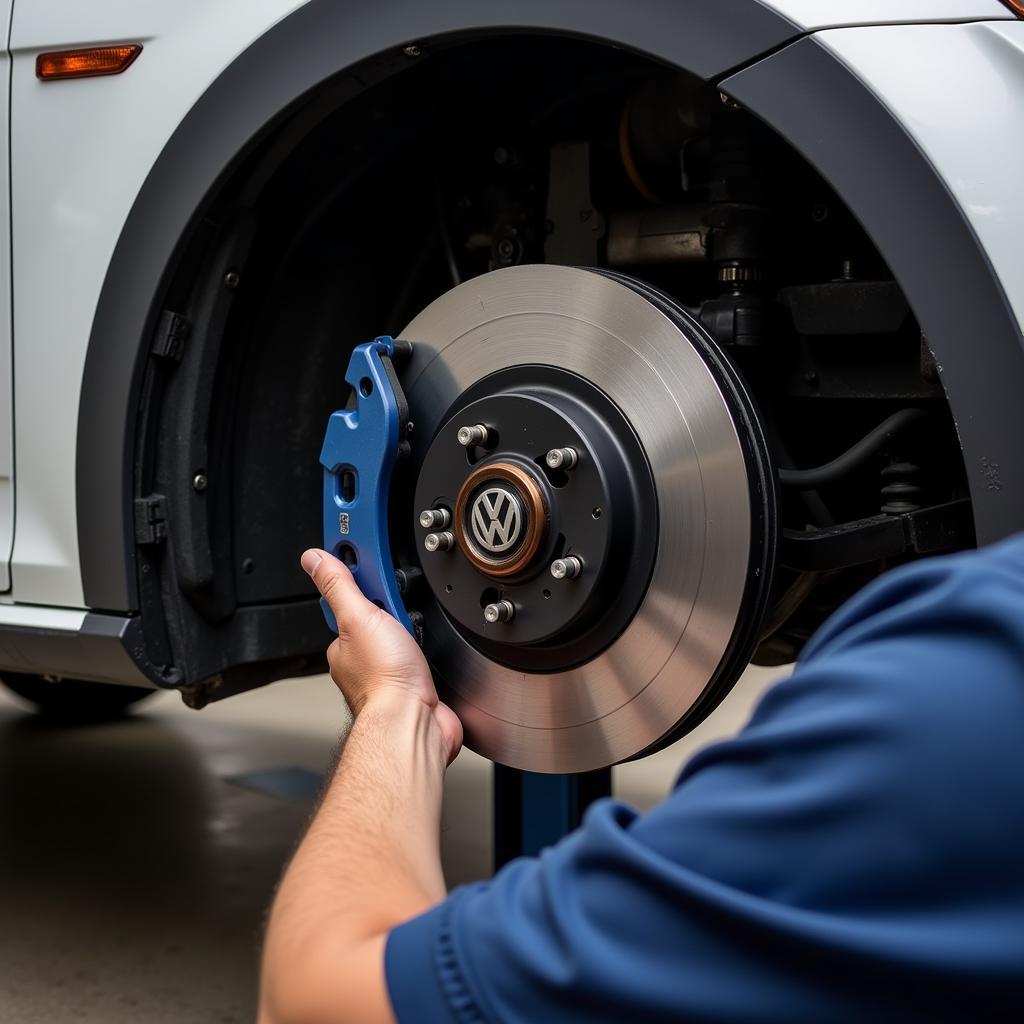The dreaded brake fluid warning light on your VW Golf dashboard can be a nerve-wracking sight. It typically signals a problem within your braking system that requires immediate attention. While it might seem intimidating, understanding what triggers this warning and how to address it can save you time, money, and potential safety hazards on the road.
Common Causes of a Brake Fluid Warning Light
The brake fluid warning light on your VW Golf illuminates for several reasons, each pointing to a specific area within the braking system:
- Low Brake Fluid: This is the most common culprit. Brake fluid naturally depletes over time, and a leak in the system can accelerate this process.
- Worn Brake Pads: As your brake pads wear down, the brake calipers need to extend further to engage the rotors. This requires more brake fluid, leading to a lower fluid level in the reservoir.
- Faulty Brake Fluid Level Sensor: The sensor in the brake fluid reservoir can malfunction, sending a false signal to your dashboard.
- Leaking Brake Lines or Hoses: Brake lines and hoses carry brake fluid under pressure. Corrosion, wear and tear, or damage can cause them to leak.
- Internal Leak in the Master Cylinder: The master cylinder is the heart of your braking system, and an internal leak can lead to a drop in brake fluid pressure and illuminate the warning light.
What to Do When the Brake Fluid Warning Light Comes On
Ignoring a brake fluid warning light is incredibly dangerous. Here’s a step-by-step guide on what to do:
- Safely Pull Over: As soon as it’s safe, pull over to the side of the road and turn off your engine.
- Check the Brake Fluid Level: Carefully open the hood and locate the brake fluid reservoir. It’s usually a translucent plastic container with a black cap, marked with “DOT” and a number indicating the type of brake fluid.
- Assess the Situation:
- If the fluid is low: Add the correct type of brake fluid until it reaches the “MAX” line.
- If you see a leak: Do not attempt to drive further. Call for a tow truck to transport your VW Golf to a mechanic.
- If the fluid level is normal: There might be a fault with the brake fluid level sensor or another component within the braking system.
Diagnosing the Problem: Remote Diagnostics and Software Solutions
In today’s tech-driven world, remote diagnostics and software solutions are transforming how we address car issues. For VW Golfs, these advanced technologies offer several benefits:
- Pinpoint Accuracy: Specialized software can communicate with your vehicle’s onboard computer, retrieving diagnostic trouble codes (DTCs) that pinpoint the root of the problem. This eliminates guesswork and unnecessary repairs.
- Remote Analysis: Qualified technicians can remotely access and analyze the data from your VW Golf, providing accurate diagnoses and recommending appropriate solutions.
- Software Updates and Programming: In some cases, a brake fluid warning light might be triggered by a software glitch. Remote programming allows technicians to install the latest software updates wirelessly, potentially resolving the issue without a trip to the shop.
2011 vw golf tdi brake fluid warning light on
The Importance of Professional Service
While adding brake fluid might seem straightforward, it’s crucial to remember that your braking system is critical for your safety. Here’s why professional service is always recommended:
- Accurate Diagnosis: Experienced technicians possess the knowledge and tools to diagnose complex brake issues accurately.
- Quality Repairs: From replacing worn brake pads to addressing leaks in the system, professionals ensure repairs are done correctly using high-quality parts.
- Safety First: Addressing brake problems promptly and effectively ensures your safety and the safety of others on the road.
“Ignoring a brake fluid warning light is like playing Russian roulette with your safety,” says Jake Anderson, a senior automotive technician with over 15 years of experience. “It’s always best to err on the side of caution and have your VW Golf inspected by a professional.”
 VW Golf Brake Pad Replacement
VW Golf Brake Pad Replacement
Preventing Future Brake Issues
Proactive maintenance is key to preventing future brake problems in your VW Golf:
- Regular Brake Inspections: Schedule brake inspections with your mechanic every 12,000 miles or as recommended in your owner’s manual.
- Timely Brake Fluid Flush: Brake fluid absorbs moisture over time, reducing its effectiveness. Aim to flush and replace your brake fluid every 2-3 years or as recommended by your manufacturer.
- Quality Brake Pads: Invest in high-quality brake pads that are designed for your specific VW Golf model.
Conclusion
A brake fluid warning light in your VW Golf is a serious matter, but understanding its causes and taking prompt action can prevent further complications. Remember, your safety is paramount, and seeking professional help ensures a reliable and effective solution for a smooth and secure driving experience.
